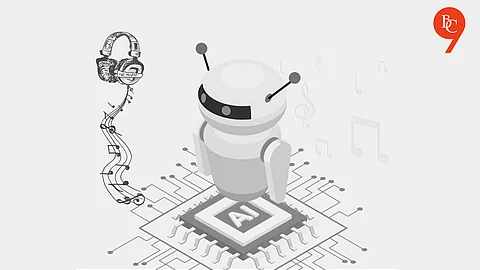

From music producers and lyricists to artists and their teams, a song requires collective efforts of many to become a reality. But what if this music-making process and the multiple contributions it requires get merged into a single entity? Artificial Intelligence (AI), which has shape-shifted into multiple professional roles, is now becoming a musical guru too.
The field of AI music startups is experiencing a surge in numbers, bringing new possibilities to music production and distribution. Startups such as Amper, AIVA, Loudly and Tapes.AI, listed among the top music tech and AI companies to watch in 2024, offer creative solutions that cater to different stages of production, distribution and curation of music. These startups give AI varied avatars that cater to various necessities of the music industry.
Startups like Amper and Loudly help in making new music as per the user’s requirements. Whereas, Tapes.AI caters to the provision of royalty-free sample packs. Snafu Records is a startup that aims to find new artists across multiple music streaming apps through its AI algorithms and empower them through identifying and signing such potential talents. AudioShake is another startup that is bringing fresh solutions through its services in quality dubbing and content localization for creators. The requirements and challenges are many and these AI music startups beat them all through the beats of their creative solutions.
With such great prospect in their hands, these AI music startups have grabbed the attention of the investors too. Many such startups have managed to gain significant funding, showcasing the potential investors have seen in this field. AI music startups like Beatoven.ai and Soundraw have recently raised significant funding from well-known investors, showing the scope for growth in this field. In 2021, Splash (formerly known as Popgun) made a huge success by raising $20 million dollar funding, with Amazon Alexa Fund as one of its investors. With big names monetarily supporting these startups, the idea of an AI-driven era of music doesn’t seem impossible anymore.
Do these AI tools have to potential to replace icons of the musical world?
The concerning factor in this booming phase of AI music startups and emerging AI tools and technologies is the fate of authentic and original creations by musical artists. These advancements are challenging the creativity of the music industry, raising several questions about the future of music.
Can there be regulations in place to overlook use of AI in the field? The experts of the industry and authorities have begun thinking on these lines in the recent times. On 20 March, 2024, Universal Music Group (UMG) and Roland responded to the question of threats to music industry posed by generative AI technologies by publishing Principles for Music Creatioon with AI. It propagates responsible use of AI in the field of music and aims for protecting human creativity. Beyond these principles, UMG and Roland plan to also work on joint research focusing on determining the origin and ownership of music (as mentioned by musically.com).
At the legal front too authorities have started to work on this problem. Tennessee became the first U.S. state to sign a legislation to protect musicians from unauthorized AI impersonations on 21 March, 2024. But with these legal actions too, the existence of AI in the industry in itself is cautioning the musicians about the coming of an era of generative AI music. However, copyright protections in the case of AI covers and replications become a challenge for the artists and the music labels.
Famous artists like Selena Gomez, Ed Sheeran, Drake and Lil Wayne have previously voiced their discomfort with the use of AI in music. Voice cloning or vocal reproduction is becoming a menace for musical legends with its close replications, like in the case of the viral Drake and The Weeknd AI-cover on Tiktok. A recent study found that 71% of the musicians (who were surveyed) fear the consequences of the coming of AI in the music industry. However, in an article by CNBC, acclaimed television and film composer Joel Beckerman highlighted how aspects like connection with the artists and creativity cannot be taken over by AI music.
It is yet to be seen what turns out of this pairing up of music with AI as new startups grow and emerge in the coming years.
